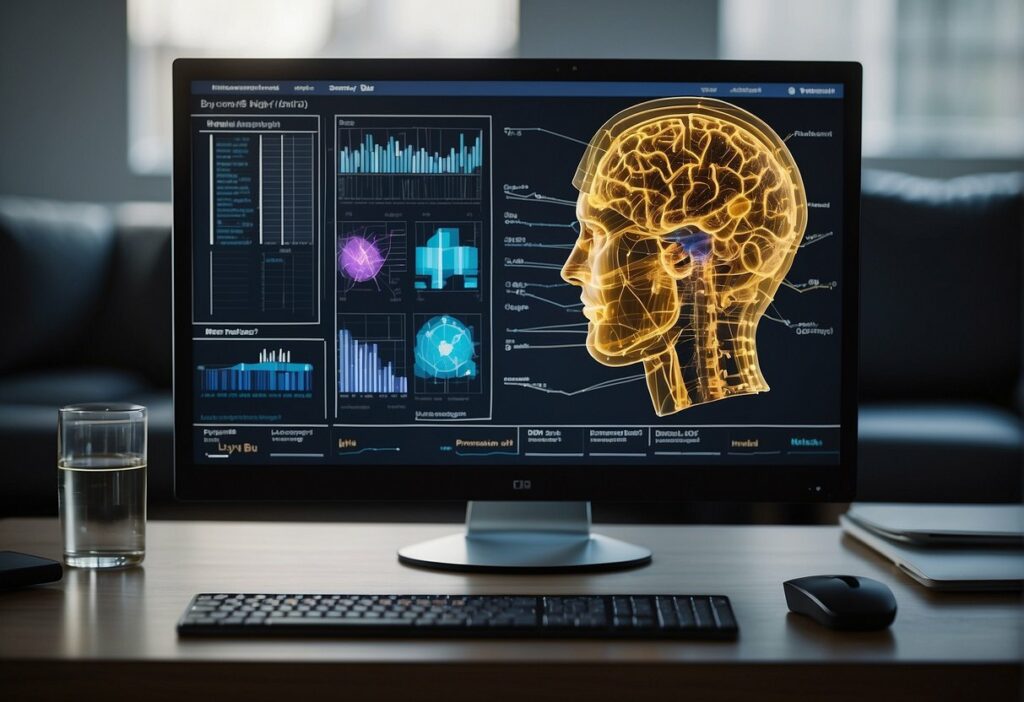AI’s Impact on Psychotherapy: Enhancing Treatment Through Behavioral Analysis Automation

Artificial intelligence is revolutionizing the field of psychotherapy by offering new ways to automate behavioral analysis, leading to more tailored and precise interventions.
AI algorithms can analyze vast amounts of data, such as speech patterns, facial expressions, and even text to detect nuances in a patient’s behavior that may indicate their psychological state. These subtleties, often imperceptible to humans, can help therapists understand clients more deeply and quickly, allowing for interventions that are highly personalized.
Incorporating AI into mental health treatment also extends the ability to monitor and support patients outside of traditional therapy sessions. Wearable devices and mobile applications equipped with AI can provide real-time feedback and therapeutic guidance, which empowers patients to manage their conditions more actively. Through continuous monitoring, AI can provide insights into the effectiveness of treatment plans, enabling therapists to make timely adjustments.
It may also increase accessibility, as AI-powered applications could offer preliminary support, bridging gaps in mental healthcare availability. However, the integration of AI into psychotherapy also presents ethical considerations regarding privacy, consent, and the therapeutic relationship, which must be navigated with care.
Evolution of Psychotherapy

Psychotherapy has undergone significant transformation, from early theoretical frameworks to the integration of sophisticated technologies that enhance therapeutic practices.
Historical Perspective
Psychotherapy, rooted in the late 19th century, began with the pioneering work of individuals like Sigmund Freud, who introduced psychoanalysis. Over time, diverse schools of thought emerged such as behaviorism, introduced by John B. Watson, and the humanistic approach, pioneered by Carl Rogers. Each movement represented a shift in understanding the complexities of the human mind and the methods best suited to treat mental health disorders.
Advancements in Technology
With the advent of the digital era, psychotherapy’s landscape has drastically changed. It now incorporates technology-driven methods such as computerized Cognitive Behavioral Therapy (CBT) and Virtual Reality Exposure Therapy (VRET). Furthermore, machine learning and big data analytics have enabled the development of customized intervention strategies, based on pattern recognition in patient-reported data, thereby tailoring treatments to individual needs.
Fundamentals of AI in Psychotherapy

Artificial Intelligence (AI) in psychotherapy integrates advanced computing techniques to enhance behavioral analysis, thus enabling more personalized therapeutic interventions.
AI Technologies
In psychotherapy, AI technologies comprise machines learning algorithms, natural language processing (NLP), and speech recognition systems. These technologies process large volumes of patient data, including speech and text, to identify patterns indicative of mental health states.
- Machine Learning Algorithms: They analyze historical and real-time data, learning from previous cases to improve diagnostic accuracy.
- Natural Language Processing (NLP): Utilized to interpret the nuances in spoken or written language, assisting in sentiment analysis and detecting emotional states.
- Speech Recognition: Helps in transcribing sessions, reading vocal tones, and recognizing speech patterns that may correlate with certain psychological conditions.
Behavioral Analysis Techniques
Behavioral analysis in AI-driven psychotherapy utilizes data-driven insights to understand and predict patient behavior, contributing to more tailored treatment plans.
- Sentiment Analysis: AI examines language use to assess emotional states, providing therapists with insights into a patient’s mood and thought patterns.
- Predictive Modelling: AI uses historical behavioral data to forecast future behaviors or potential outcomes, aiding in preemptive care strategies.
- Pattern Recognition: AI identifies recurring behaviors or speech patterns that may signal specific disorders, facilitating early intervention and targeted therapy.
Integrating AI with Therapeutic Practices

Artificial intelligence is reshaping psychotherapy by providing tools that analyze and interpret patient data for personalized care.
AI-Powered Therapeutic Tools
AI applications in psychotherapy extend to virtual therapists, software capable of offering preliminary counseling and support through natural language processing. Behavioral analysis algorithms can identify patterns in speech and text, offering therapists insights into a patient’s emotional state beyond self-reported information. For example, wearables that track physiological data, such as heart rate and sleep patterns, can feed information into AI systems to detect signs of stress or depression.
Customizing Interventions
Artificial intelligence enables therapists to tailor interventions to the individual’s needs by analyzing large volumes of patient data. Decision support systems can suggest therapeutic techniques based on historical success rates with similar cases. AI can also predict potential outcomes of different therapeutic approaches, allowing for a more strategic selection of interventions. By integrating patient history, current symptoms, and response to past treatments, AI supports a more nuanced and dynamic approach to care.
Ethical Considerations
The integration of AI into psychotherapy raises several ethical issues that must be managed carefully. Patient privacy and data security are paramount, as therapy involves sensitive personal information. Responsible AI use demands stringent data protection measures and transparent data handling protocols. Moreover, algorithmic bias is a concern, as it may impact the quality of care offered to diverse populations. Therapists and developers must ensure that AI tools are designed and tested for fairness and inclusivity.
Impact and Effectiveness

Artificial Intelligence (AI) in psychotherapy brings precision to behavioral analysis, enabling tailored interventions. This technology enhances treatment outcomes by providing real-time data and patient-specific insights.
Case Studies
Several case studies demonstrate AI’s efficacy in psychotherapy. One study involving patients with depression utilized machine learning algorithms to monitor speech patterns, predicting the onset of depressive episodes with 79% accuracy. Another study employed AI to analyze text from therapy sessions, leading to improvements in therapeutic techniques and patient engagement.
Quantitative Outcomes
Quantitative outcomes are fundamental in evaluating AI’s impact on psychotherapy. Data from numerous clinical trials indicate a stark reduction in the time needed for therapists to diagnose patients accurately.
- Time reduction for diagnosis: 30% on average
- Increase in treatment adherence: 50%
Machine learning models have also been instrumental in increasing treatment adherence by predicting patients’ likelihood of following through with therapy, leading to personalization of intervention strategies.
Future Directions

Exploring the future of AI in psychotherapy involves examining imminent innovations and addressing both the challenges and opportunities they present.
Innovations on the Horizon
Artificial Intelligence (AI) continues to advance, with specific innovations poised to enhance behavioral analysis in psychotherapy. One key development is the integration of natural language processing (NLP) and machine learning to better interpret patient language and affect. Systems that utilize NLP are becoming capable of not only understanding spoken or written words but also detecting subtleties such as tone and context to provide more personalized therapy.
Another anticipated innovation is virtual reality (VR), offering immersive environments that help patients confront and build resilience against anxieties in a controlled, safe setting. The data collected through VR sessions can be analyzed by AI to further tailor therapeutic interventions.
Challenges and Opportunities
With the integration of AI in psychotherapy, professionals are likely to encounter a spectrum of challenges and opportunities.
- Ethical considerations become more complex with AI, such as ensuring patient data privacy and informed consent for AI-driven interventions.
- Regulatory compliance will need to keep up with the technology, creating frameworks that safeguard patient welfare while enabling innovation.
Opportunities, however, are abundant:
- AI can increase accessibility to mental health services for those in remote or underserved locations.
- There is potential for AI to reduce healthcare costs and provide support for therapists via administrative task automation and preliminary diagnostics.
| Challenges | Opportunities |
|---|---|
| Ethical decisions | Increased Accessibility |
| Regulatory hurdles | Reduced Healthcare Costs |
